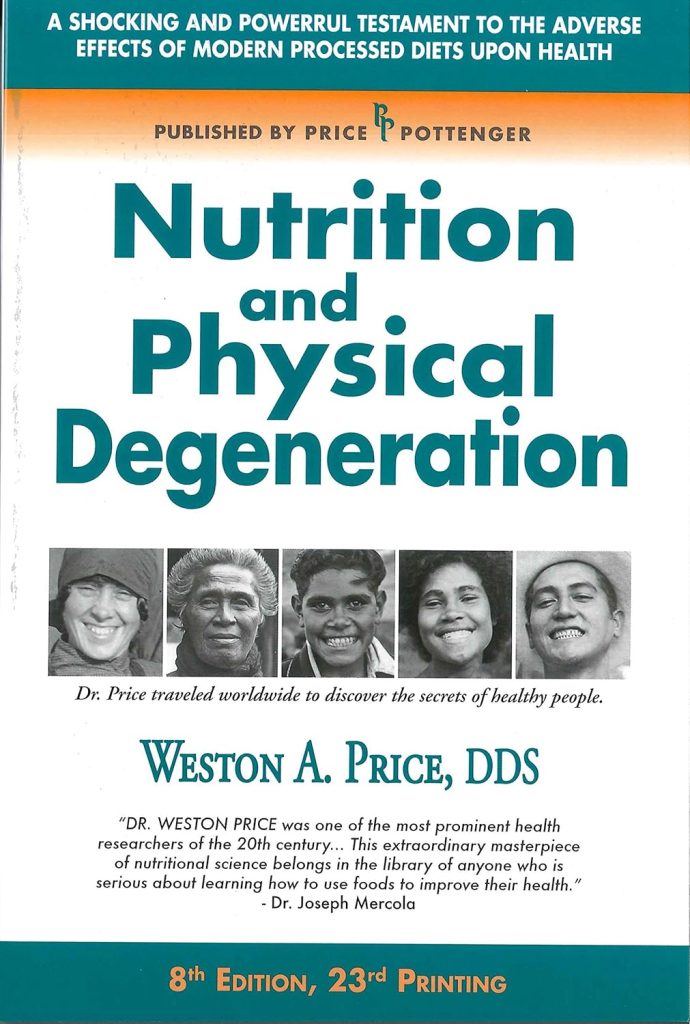Nutrition and Physical Degeneration by Dr. Weston A. Price is a groundbreaking work that examines the impact of modern diets on health, drawing on Price’s extensive research conducted during the early 20th century. Dr. Price, a dentist, travelled to remote areas around the globe, studying populations that had little to no exposure to Western processed foods. His findings, which he meticulously documented with photographs and case studies, highlight the drastic differences in health and physical development between these indigenous groups and their counterparts in Westernized societies.
Core Premise:
The central premise of the book is that the adoption of modern diets—high in refined sugars, flours, vegetable oils, and processed foods—leads to physical degeneration, particularly evident in dental health and facial structure. In contrast, populations adhering to traditional diets, rich in unprocessed, nutrient-dense foods, displayed remarkable physical health, resistance to chronic diseases, and well-formed dental arches.
Key Observations:
- Traditional Diets and Health:
Dr. Price visited isolated communities across the world, including Swiss mountain villages, Native American tribes, African tribes, Pacific Islanders, and Aboriginal Australians. In these groups, he observed that individuals consuming traditional diets were free from many of the diseases and dental problems plaguing modern society. Their diets, though varied depending on geography and local resources, consistently featured whole, unprocessed foods—raw milk, wild-caught fish, organ meats, vegetables, and naturally fermented grains. Despite the lack of modern medical care, these populations exhibited excellent health, robust physiques, and strong, straight teeth. - Dental Arch Deformities and Physical Degeneration:
One of Dr. Price’s major findings was the rapid deterioration in dental health when these populations transitioned to modern diets. In those who began consuming refined sugars, white flour, and canned foods, he observed significant changes within a single generation. Children born to parents who had switched to modern diets frequently exhibited dental crowding, malocclusion (improper bite), and narrower dental arches. These physical deformities were not limited to the teeth; they often extended to narrower faces, reduced nasal capacity, and other skeletal changes. Price connected these dental issues with broader indicators of physical degeneration, such as increased susceptibility to disease. - The Importance of Fat-Soluble Vitamins:
Price emphasized the critical role of fat-soluble vitamins—particularly vitamins A, D, E, and K—in maintaining health. Traditional diets were rich in these nutrients, derived from foods like fish liver oils, butter from grass-fed animals, eggs, and certain organs like liver. These nutrients, he argued, were essential not just for dental and skeletal health, but also for immune function and overall physical vitality. Price was especially focused on vitamin K2 (which he called “Activator X”), noting its role in the proper development of the skeletal system and prevention of dental decay. - The Generational Impact of Nutritional Deficiencies:
One of Price’s most striking conclusions was that the effects of poor nutrition could be observed across generations. Parents consuming a nutrient-deficient diet often gave birth to children with narrower faces, crooked teeth, and increased health issues. Price documented cases where families with multiple children exhibited a stark contrast between older children, who had grown up on traditional diets, and younger children born after the family adopted a Western diet. - The Link Between Diet and Disease:
Beyond dental health, Price connected modern diets with an increased incidence of chronic diseases, including tuberculosis, heart disease, and mental health disorders. Populations consuming traditional diets showed a remarkable resistance to these conditions, even when living in environments where infectious diseases were prevalent. Price’s work suggests that diet plays a foundational role in the body’s ability to ward off both infectious and non-infectious diseases. - Cultural Knowledge of Nutrition:
Dr. Price discovered that traditional populations had an intuitive understanding of the importance of nutrition, particularly for pregnant women and young children. Many of the groups he studied practiced dietary rituals around conception and pregnancy, often ensuring that expectant mothers consumed highly nutritious foods like fish eggs, organ meats, and butter. These practices were aimed at supporting the health of both mother and child, ensuring proper fetal development and long-term vitality.
Conclusions and Legacy:
Price’s book concludes with a strong endorsement of whole, nutrient-dense foods and a critique of modern processed diets. He advocated for returning to a diet that more closely resembles that of our ancestors, including a focus on whole grains, organic produce, raw dairy, and properly prepared animal products. He believed that doing so could reverse much of the physical degeneration caused by modern diets.
Nutrition and Physical Degeneration has had a lasting influence on the fields of nutrition, dentistry, and holistic health. Price’s findings remain relevant to modern discussions about the benefits of whole, unprocessed foods and the consequences of refined, industrialized diets. His work continues to inspire movements such as the Weston A. Price Foundation, which promotes traditional diets and farming practices as the foundation for good health.
Criticisms and Contemporary Relevance:
While Nutrition and Physical Degeneration is widely praised for its pioneering work in connecting diet with physical health, it has also faced some criticism. Some skeptics argue that Price’s research methods lack the scientific rigor of modern nutritional science, particularly given the absence of controlled studies. However, the book’s emphasis on nutrient density and the dangers of processed foods remains highly relevant, particularly in light of the global rise in diet-related diseases like obesity, diabetes, and heart disease.
In summary, Nutrition and Physical Degeneration offers a compelling argument for the power of nutrition to shape not only individual health but also the vitality of future generations. It stands as a testament to the wisdom of traditional diets and the potential dangers of modern, industrialized food.
